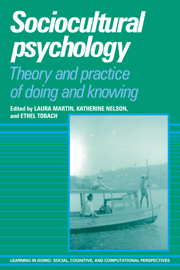Book contents
- Frontmatter
- Contents
- Series foreword
- Preface
- Contributors
- 1 Introduction
- Part I History and culture
- 2 Situated theory as a bridge between psychology, history, and educational practices
- 3 The uniqueness of human labor
- 4 Reflecting on Russian consciousness
- Part II Doing psychology
- Part IV Activity in work and school
- Index
4 - Reflecting on Russian consciousness
Published online by Cambridge University Press: 05 November 2011
- Frontmatter
- Contents
- Series foreword
- Preface
- Contributors
- 1 Introduction
- Part I History and culture
- 2 Situated theory as a bridge between psychology, history, and educational practices
- 3 The uniqueness of human labor
- 4 Reflecting on Russian consciousness
- Part II Doing psychology
- Part IV Activity in work and school
- Index
Summary
I have often thought about the curious contradiction that has existed in Russian intellectual culture – how a country with such a long and chilling record of despotically suppressing ideas, even consciousness, could at the same time breed such searchingly conscious literature. Indeed, the contradiction, so evident in Czarist Russia, even survived the revolution of 1917. It even manifested itself within the microcosm of Russian psychology, torn as it has been for over a century between the gross and reductionist reflexologies of Sechenov and Pavlov, on the one side, and the psychological and cultural subtleties of Vygotsky and Luria on the other. Here is a culture of unquestionable social and intellectual power that seems forever torn between the conflicting ideals of unreflective and mindless obedience backed by force and deeply subjective, conscious reflection. Even as I write, the Russian nation is being subjected to two such crazily divergent scenarios as the bombardment of its Parliament building, its “White House,” accompanied by a request to reflect on a new Constitution – both on the orders of the same leader, its “President.”
I want particularly to set down my reflections on this puzzling issue in this volume dedicated to the memory of Sylvia Scribner. For she was one of two people with whom I ever discussed this matter seriously – the only psychologist – the other being Sir Isaiah Berlin who was the president of my college at Oxford and my good friend during a decade of teaching at that great university.
- Type
- Chapter
- Information
- Sociocultural PsychologyTheory and Practice of Doing and Knowing, pp. 67 - 86Publisher: Cambridge University PressPrint publication year: 1995
- 6
- Cited by



